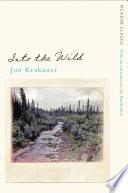Quotes from book
Into the Wild

Into the Wild is a 1996 non-fiction book written by Jon Krakauer. It is an expansion of a 9,000-word article by Krakauer on Christopher McCandless titled "Death of an Innocent", which appeared in the January 1993 issue of Outside. The book was adapted to a film of the same name in 2007, directed by Sean Penn with Emile Hirsch starring as McCandless. Into the Wild is an international bestseller which has been printed in 30 languages and 173 editions and formats. The book is widely used as high school and college reading curriculum. Into the Wild has been lauded by many reviewers but has also been described by Alaskan reporter, Craig Medred, as being "something invented" by its author.
“What if I were smiling and running into your arms? Would you see then what I see now?”
Source: Into the Wild
Source: Into the Wild (1996), Ch. 14.
Context: Early on a difficult climb, especially a difficult solo climb, you constantly feel the abyss pulling at your back. To resist takes a tremendous conscious effort; you don't dare let your guard down for an instant. The siren song of the void puts you on edge; it makes your movements tentative, clumsy, herky-jerky. But as the climb goes on, you grow accustomed to the exposure, you get used to rubbing shoulders with doom, you come to believe in the reliability of your hands and feet and head. You learn to trust your self-control. By and by your attention becomes so intensely focused that you no longer notice the raw knuckles, the cramping thighs, the strain of maintaining nonstop concentration. A trancelike state settles over your efforts; the climb becomes a clear-eyed dream. Hours slide by like minutes. The accumulated clutter of day-to-day existence — the lapses of conscience, the unpaid bills, the bungled opportunities, the dust under the couch, the inescapable prison of your genes — all of it is temporarily forgotten, crowded from your thoughts by an overpowering clarity of purpose and by the seriousness of the task at hand. At such moments something resembling happiness actually stirs in your chest, but it isn't the sort of emotion you want to lean on very hard. In solo climbing the whole enterprise is held together with little more than chutzpah, not the most reliable adhesive.
Source: Into the Wild (1996), Ch. 14.
Context: Early on a difficult climb, especially a difficult solo climb, you constantly feel the abyss pulling at your back. To resist takes a tremendous conscious effort; you don't dare let your guard down for an instant. The siren song of the void puts you on edge; it makes your movements tentative, clumsy, herky-jerky. But as the climb goes on, you grow accustomed to the exposure, you get used to rubbing shoulders with doom, you come to believe in the reliability of your hands and feet and head. You learn to trust your self-control. By and by your attention becomes so intensely focused that you no longer notice the raw knuckles, the cramping thighs, the strain of maintaining nonstop concentration. A trancelike state settles over your efforts; the climb becomes a clear-eyed dream. Hours slide by like minutes. The accumulated clutter of day-to-day existence — the lapses of conscience, the unpaid bills, the bungled opportunities, the dust under the couch, the inescapable prison of your genes — all of it is temporarily forgotten, crowded from your thoughts by an overpowering clarity of purpose and by the seriousness of the task at hand. At such moments something resembling happiness actually stirs in your chest, but it isn't the sort of emotion you want to lean on very hard. In solo climbing the whole enterprise is held together with little more than chutzpah, not the most reliable adhesive.
“A trancelike state settles over your efforts; the climb becomes a clear-eyed dream.”
Source: Into the Wild (1996), Ch. 14.
Context: Early on a difficult climb, especially a difficult solo climb, you constantly feel the abyss pulling at your back. To resist takes a tremendous conscious effort; you don't dare let your guard down for an instant. The siren song of the void puts you on edge; it makes your movements tentative, clumsy, herky-jerky. But as the climb goes on, you grow accustomed to the exposure, you get used to rubbing shoulders with doom, you come to believe in the reliability of your hands and feet and head. You learn to trust your self-control. By and by your attention becomes so intensely focused that you no longer notice the raw knuckles, the cramping thighs, the strain of maintaining nonstop concentration. A trancelike state settles over your efforts; the climb becomes a clear-eyed dream. Hours slide by like minutes. The accumulated clutter of day-to-day existence — the lapses of conscience, the unpaid bills, the bungled opportunities, the dust under the couch, the inescapable prison of your genes — all of it is temporarily forgotten, crowded from your thoughts by an overpowering clarity of purpose and by the seriousness of the task at hand. At such moments something resembling happiness actually stirs in your chest, but it isn't the sort of emotion you want to lean on very hard. In solo climbing the whole enterprise is held together with little more than chutzpah, not the most reliable adhesive.